
50 Ways to Leave Your Lectern
Book details
Summary
Description
Today's college teacher is caught between paradigms: to lecture or not to lecture. Lecturing is now described as ineffective and passe in today's world of higher education. In practice, however, most professors still lecture because they were taught by the lecture method; they were conditioned to become auditory learners, and they have had no formal training in alternative teaching methods. Faculty are biologists, art historians, or mathematicians, and they think of teaching in terms of quantifiable content. But if lecturing is "out," what is "in"? How does one move from "empty vessel" to active learning? How can we truly engage today's student? Trends in higher education have begun to shift the teacher's role from soloist or center-stage performer to conductor, orchestrating and synthesizing a dynamic, multifaceted learning experience. Yet the question lingers: How do we leave our lecterns? How can teachers engage students? Staley's book offers you a proven way to stimulate thinking, discussion, and group interaction. Each exercise in 50 WAYS TO LEAVE YOUR LECTERN will ask you to identify your ABC Goals for the activity at the outset based on Bloom's Affective, Behavioral, and Cognitive goals. Professors may be accustomed to concentrating primarily on cognitive goals; however, all three types of goals are important. Unlike upper division courses with more specialized knowledge; affective, behavioral, and cognitive goals should be more equally balanced in first-year courses.


We would LOVE it if you could help us and other readers by reviewing the book
Book review



